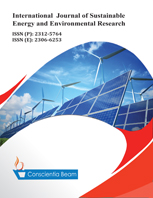Energy Consumption and Economic Growth in Nigeria: A Causality Analysis
Abstract
This paper attempts to investigate the relationship between total energy consumption and economic growth in Nigeria using Granger Causality. The two variables of the study – energy consumption and real GDP were found to exhibit unit root property, i.e. non-stationary. The study finds no clear relationship between energy consumption and economic growth. Real GDP was found not to cause energy consumption while energy consumption was also found not to cause real GDP. As astounding as this result may be, it portends potential policy implications for the economy including the need to implement policies that link energy consumption with growth generating activities.
Keywords:
Energy consumption, Economic growth, Causality analysis, Cointegration, Stationarity, NigeriaPublished
2014-03-20
How to Cite
Oyaromade, R. ., Mathew, A. ., & Abalaba, B. P. (2014). Energy Consumption and Economic Growth in Nigeria: A Causality Analysis. International Journal of Sustainable Energy and Environmental Research, 3(1), 53–61. Retrieved from https://archive.conscientiabeam.com/index.php/13/article/view/2086
Issue
Section
Articles

